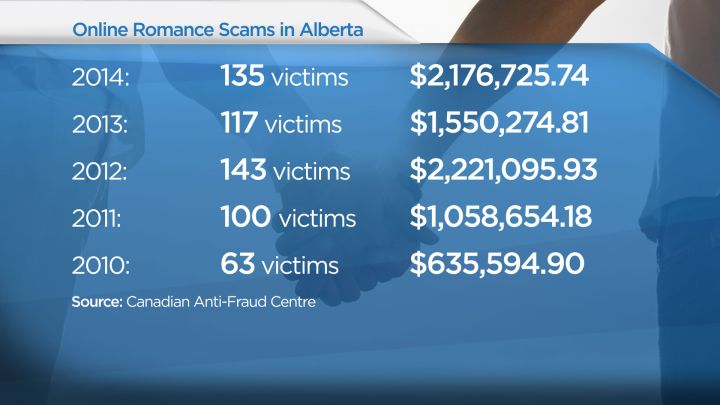WATCH ABOVE: Global’s Erika Tucker on warnings signs you may be a victim of an online romance scam

CALGARY – Online dating sites like OK Cupid, eHarmony, LavaLife and Plenty of Fish will be at the tips of many singles’ fingers this week leading up to Valentine’s Day. But if your potential match seems too hot to be true, drops the “L” word too soon, or avoids meeting you in person, you should be wary of the potential that it’s all a scam.
The Better Business Bureau (BBB) of Southern Alberta is warning people of these online romance scams, including catfishing—when someone sets up a fake profile to trick you out of money. If you think it’s a rare occurrence, Canadians lost nearly $14 million to such romance scams last year alone.
In Alberta, 135 victims lost about $2,176,000 last year—and you can see the increase in lost funds over the last five years in the graphic below:
Here are the Calgary numbers:
Only one to five per cent of victims report these crimes, according to Daniel Williams from the Canadian Anti-Fraud Centre, who says the actual numbers are sadly much higher.
“The sense of loss and betrayal can be immense, and matter so much more to the victim than the actual money lost.”

Get daily National news
Williams says the “gangs” use templates when they are e-mailing their intended victims, especially in the early stages of the scam – which can actually take several months depending on the gang. So it’s not typically a one-time message asking for money right off the bat; they have the time and resources to gain your trust over months.
Williams says scammers often copy names and photos of people from the U.S. military website, for example, and add those to their online profiles. He says the fraudsters want you to check them out on sites like Facebook–but the question isn’t whether it’s a real person, it’s whether that person is the person you’ve been talking to.
The BBB warns that online dating opens the window of opportunity for scammers, whether that be through fake profiles or requests for money. It may sound like common sense, but older singles who may not be as familiar with certain websites could be vulnerable to such scams in their quest for love.
READ MORE: Lessons learned by seniors from online dating scams
Williams says the overall majority of victims are people between 40 and 69 years of age, who may be coming out of a long-term marriage through divorce or being widowed.
“People who aren’t in a relationship can feel lonely or excluded from this holiday, so they turn to online dating sites to make a quick connection with someone,” said BBB of Southern Alberta CEO Sandra Crozier-McKee.
Here are some tips from the Canadian Anti-Fraud Centre and the BBB of Southern Alberta to avoid becoming a victim:
- “Too hot to be true” – If you’re pushing 60 and you’re approached by a twenty-something, that’s a red flag. Catphishers often don’t use their own photos.
- Hurrying to get off of the site – Scammers are often anxious to leave dating websites so they don’t get caught, but want to keep talking through email, instant messaging, or phone calls rather than meet in person.
- The ‘L’ word – Be suspicious if someone tells you they love you sooner than you expect or are comfortable with.
- Talking trust – Scammers tend to talk about how important trust is to them in an effort to prepare you for a request for money that they’ll promise to pay back.
- Tell a hard luck tale – Fraudsters will do this in an attempt to gain sympathy, and potentially money from you.
Other tell-tale signs include when people try to avoid meeting in person, claim they live far away unless you agree to pay for their trip to see you, or communicate in broken English.
Anti-fraud experts emphasize you should never send money, even if you feel close to the person you’ve been talking to.
“If you receive a ‘pay cheque’ or another form of payment from someone you’ve met online and they ask you to cash it and send a portion of the funds back to them – don’t do it! It’s a counterfeit cheque and you’ll be responsible to cover any fees from the bank,” says a warning on the Canadian Anti-Fraud Centre site.
If you think you or someone you know has been a victim of fraud, contact the Canadian Anti-Fraud Centre at 1-888-495-8501 or report online through the website at http://www.antifraudcentre.ca.
Email the author erika.tucker@globalnews.ca







Comments
Want to discuss? Please read our Commenting Policy first.